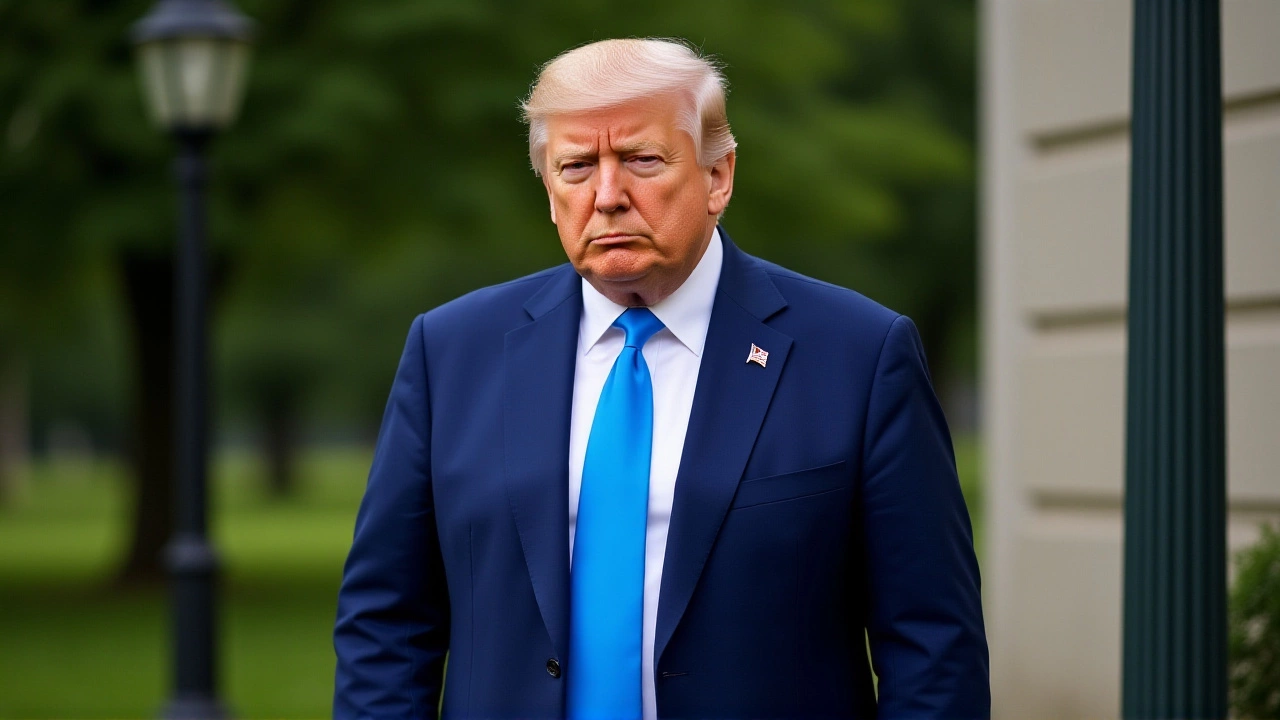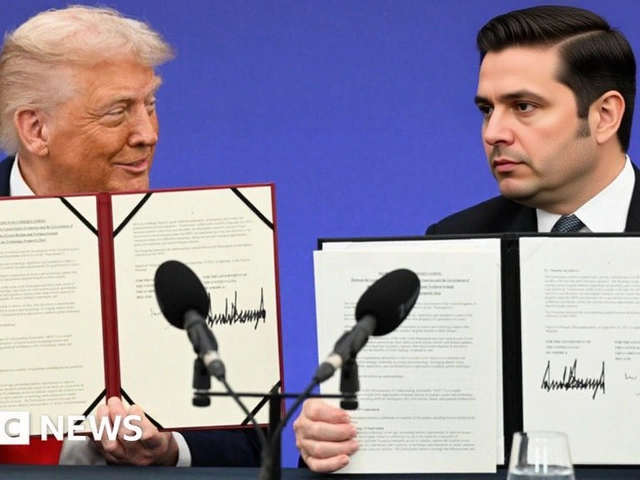On September 16, 2025, Microsoft unveiled a $30 billion investment in the United Kingdom’s AI infrastructure — the largest single commitment the company has ever made in the country. The move, announced during President Donald Trump’s second state visit to the UK, kicked off what officials are calling the Technology Prosperity DealUnited Kingdom, a sweeping partnership between American tech giants and the British government. It’s not just about money. It’s about power — the power to build the next generation of artificial intelligence, and who gets to control it.
A New Era of Tech Investment
The $30 billion from Microsoft isn’t just a checkbook gesture. Of that, $15 billion will go directly into building physical infrastructure: data centers, cooling systems, fiber networks, and power grids to support AI workloads. The centerpiece? A supercomputer with over 23,000 NVIDIA GPUs — the most powerful machine ever assembled in the UK, built in partnership with Nscale. This isn’t just for research. It’s for training the next wave of generative AI models — models that could reshape healthcare, finance, and national security. But Microsoft isn’t alone. NVIDIA pledged £11 billion to develop what it calls “AI factories” — dedicated facilities for training massive AI models. Google committed £5 billion to construct a new data center in Waltham Cross, Hertfordshire, expected to create 8,250 jobs annually. And BlackRock, the world’s largest asset manager, threw in £500 million — £100 million of which will fund an expansion west of London. Together, the total package hits £31 billion ($39 billion), making this the biggest tech investment in UK history.Why Now? The Political Backdrop
The timing is no accident. The UK economy has been stuck in a rut: zero GDP growth, capital fleeing overseas, and a public sector struggling to fund its own digital ambitions. Prime Minister Keir Starmer had spent months courting Washington — a strategy RUSI called his “charm offensive.” It worked. The deal was announced just as Trump landed in London, signaling a new alignment between American tech muscle and British political will. Starmer called it “a generational step change.” He didn’t just praise the money. He praised the message: “This commitment will not only strengthen our digital infrastructure and support thousands of highly skilled jobs, but also ensure Britain remains at the forefront of global innovation.” The message was clear: the UK doesn’t need to rely on China’s AI investments to stay relevant. It can partner with the West — and win.Who Benefits? Jobs, Tax Revenue, and Power
The numbers tell a compelling story. Before the deal, the UK’s tech sector already contributed £150 billion annually to GDP and generated £640 million in tax revenue from data centers alone. By 2035, experts at Reed Smith predict the sector could add another £44 billion — if the infrastructure keeps up. The new investments could double that. NVIDIA’s commitment to supply its latest chips — the Grace Hopper and Blackwell Superchips — means UK researchers won’t be stuck with outdated hardware. Google’s new data center in Hertfordshire will create not just construction jobs, but roles in AI ethics, cybersecurity, and cloud engineering. Microsoft’s existing 6,000 UK employees will grow, and its AI labs in Cambridge and Edinburgh will get the computing power they’ve been begging for.
The Sovereignty Question
But here’s the twist: not everyone sees this as a win. Just Security, a Washington-based policy group, issued a blunt warning in its September 16 analysis: “The U.K. will become more beholden to U.S. technology firms and less able to shape the important technologies it hopes to build on top of.” The concern? The UK is trading long-term autonomy for short-term growth. If Microsoft and NVIDIA control the hardware, the training data, and the algorithms, who really sets the rules? Can the UK pass its own AI regulations without risking retaliation? Can it protect its citizens’ data if the servers are owned by American corporations? The UK government’s own AI action plan, unveiled earlier this year, never answered how it would pay for these ambitions. Now, it hasn’t had to. The money came from Silicon Valley — but at a cost. As Gregor Pryor of Reed Smith put it, “Its success will be reflected in the capital invested and in the creation of durable partnerships.” But durability doesn’t always mean independence.What Comes Next?
The next 18 months will be critical. Construction on Microsoft’s supercomputer begins in early 2026. NVIDIA plans to open its first UK AI factory by mid-2027. Google’s data center will be operational by 2028. But beyond bricks and servers, the real test is governance. Will the UK establish its own AI oversight body? Will it require transparency from these firms? Or will it become a passive host — a testbed for American innovation? Meanwhile, the EU is watching. China is recalibrating. And startups across Britain are wondering: will they get a seat at the table, or just clean up after the giants?
Historical Context: From EPD to TPD
This deal didn’t come out of nowhere. It follows the U.S.-UK Economic Prosperity DealUnited Kingdom, signed in May 2025, which focused on trade barriers and regulatory alignment. But the September announcement shifted gears — away from policy tweaks, toward private capital. That’s significant. It means the UK is no longer asking Washington for help fixing its tax code. It’s asking for help building its future. The irony? The U.S. is doing the same thing domestically — pouring billions into AI infrastructure through the CHIPS Act. But now, the UK is getting a front-row seat. The question isn’t whether this is good for Britain. It’s whether it’s enough.Frequently Asked Questions
How will this investment affect UK tech workers?
The deal is expected to create over 15,000 direct high-skill jobs across data center operations, AI engineering, and cybersecurity, with another 25,000 indirect roles in supply chains and local services. Google alone projects 8,250 annual jobs from its Hertfordshire center. But there’s concern about wage stagnation — if foreign firms dominate hiring, local talent may be locked into contract roles without long-term career paths.
Why did Microsoft choose the UK over other European countries?
The UK offers strong English-language talent, established research institutions like Cambridge and Imperial College, and a legal system familiar to American firms. Unlike Germany or France, it has no data localization laws that restrict cloud operations. Plus, after Brexit, the UK was more willing to offer tax incentives and fast-tracked permits — making it the most attractive EU-aligned market for U.S. tech giants.
What role does NVIDIA play beyond selling chips?
NVIDIA isn’t just a supplier — it’s a co-architect. Its £11 billion investment includes building proprietary software stacks, training UK engineers on its AI frameworks, and licensing its AI factory design templates to British firms. This creates deep technical dependency. Once a company builds on NVIDIA’s ecosystem, switching to competitors becomes prohibitively expensive — locking the UK into a U.S.-controlled tech stack.
Is this deal a replacement for government funding?
In practice, yes. The UK government had planned to spend £10 billion on AI infrastructure by 2030 — but has so far allocated less than £1 billion. The Tech Prosperity Deal effectively outsources the entire funding burden to U.S. corporations. While this avoids public debt, it also means the UK has little leverage to demand open access, public data sharing, or ethical safeguards.
Could this deal trigger a tech arms race with the EU or China?
Absolutely. The EU is already accelerating its own AI Act and digital sovereignty initiatives. China, seeing the UK as a gateway to Western markets, may respond by doubling down on its AI investments in Southeast Asia and Africa. The real risk isn’t losing the race — it’s becoming a pawn in someone else’s.
What happens if Microsoft or NVIDIA pulls out in five years?
That’s the biggest unknown. Unlike public infrastructure, these data centers are privately owned. If U.S. regulations change — say, if export controls on AI chips tighten — the UK could be left with billion-dollar facilities it can’t fully operate. There’s no legal guarantee these companies will maintain operations, upgrade hardware, or transfer knowledge. The UK is betting its future on corporate goodwill.





